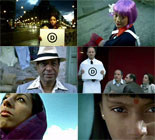March 7, 2005
Press Release, March 8 (WG16)
Thematic Subject Area IV: Civil Society
Working Group 16
Civil Society Strategies
March 8th, the International Summit on Democracy and Terrorism will host a ten member working group which will debate the various ways and means that civil society can be mobilised to counter violence; using as a base the idea, that if civil society is to be effective in the prevention of terrorism, it must develop a systematic understanding of its potential as well as its limitations. This group aims to outline practical strategies that can be implemented across the globe.
Specific issues to be addressed are:
- Can civil society groups organise effective networks to counter violence, both in the short and long term?
- How effective are particular modes of organisation? Is any organisation necessary?
- What can states, international institutions and other external actors do to encourage and support this? What should be done if they are trying to prevent it?
Working group members will include:
Members:
- Manuel Castells (Spain-Spain), professor of Sociology at the University of California at Berkeley. Numerous publications on urban sociology, the sociology of development, and - more recently – information technology. Adviser to many governments and international organisations.
- Aldo Civico (Italy-USA), research associate at the Center for International Conflict Resolution, Columbia University. Interests include civil society and political violence in Colombia. Columnist for newspapers in Germany and Italy, as well as advisor to former Italian Prime Minister Prodi.
- Hana’a Edwards (Iraq), director of the Iraqi human rights organisation Al Amal. A veteran of the women’s rights movement in the 1960s, she is now at the forefront of the struggle for gender equality in the new Iraq.
- Kamel Jendoubi (Tunisia), president of the Fédération Tunisienne des Citoyens des Deux Rives. Tunisian activist, based in France. Also director and board member of various other immigration, democracy and human rights committees and organisations.
- Natasa Kandic (Serbia), head of the Humanitarian Law Centre, Belgrade. Formerly a union activist. Exposed atrocities and human rights abuses committed by Serbian forces during the break-up of Yugoslavia. Produced detailed reports on ethnic cleansing and mass rapes in Bosnia.
- Irene Khan (Pakistan-UK), secretary general of Amnesty International. Leading authority on human rights in the context of extreme violence and warfare. Two decades of service with the United Nations High Commissioner for Refugees.
- Parvez Imroz (India), director of the Public Commission on Human Rights. Human rights lawyer and activist in Kashmir. Founder and president of the J & K Coalition of Civil Society, working to build alliances between Kashmiri civil society groups.
- Shiva Vandana (India), director of the Research Foundation for Science, Technology and Natural Resources, India. Physicist, philosopher and environmental activist. Recipient of numerous international awards. One of the leaders of the International Forum on Globalization.
- Mient Jan Faber (Netherlands), Secretary General of the Interchurch Peace Council. Peace activist in Eastern Europe under communism, and subsequently in the Middle East, Kosovo, Kashmir and Iraq. Also serves as political director of the Helsinki Citizens' Assembly.
- Emilio de Capitani (Italy), Head of Unit at the Committee on Citizens’ Freedoms and Rights, European Parliament. Expert in the field of justice, as well as home and constitutional affairs. (External member).







